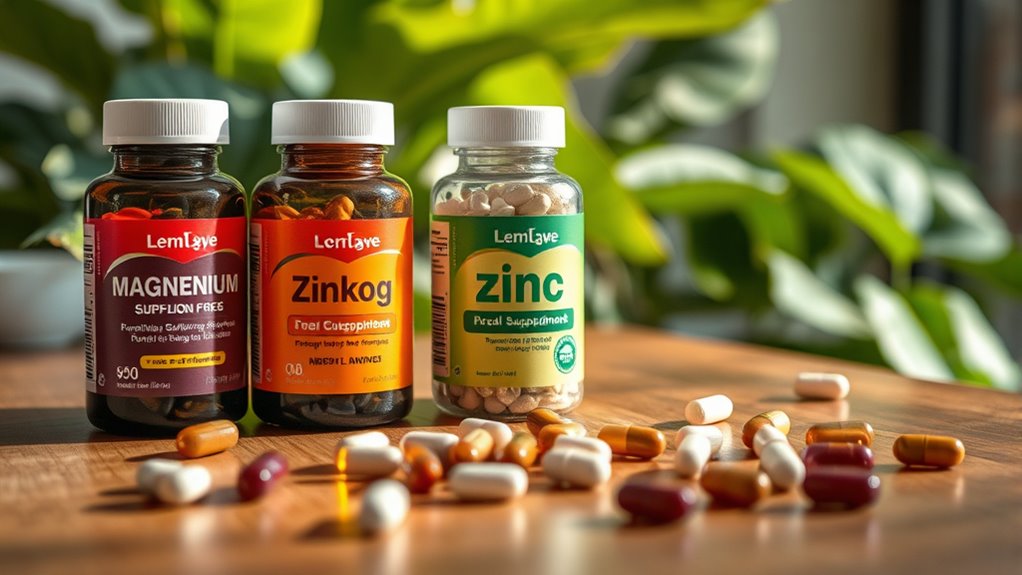Supplements like magnesium, zinc, and Ginkgo can support your health by filling nutritional gaps and boosting key functions. Magnesium helps with muscle and energy, zinc strengthens immunity, and Ginkgo may improve brain circulation. While supplements are beneficial, they work best alongside a balanced diet and healthy lifestyle. If you want to learn how these nutrients can benefit you specifically, keep exploring how they fit into your wellness journey.
Key Takeaways
- Supplements like magnesium, zinc, and Ginkgo can help fill nutritional gaps and support overall health.
- Magnesium aids enzyme functions, muscle health, sleep, and energy, especially when dietary intake is insufficient.
- Zinc boosts immune function, wound healing, and enzyme activity, but requires balanced intake for optimal absorption.
- Ginkgo may improve brain circulation and memory, but results vary; combining with healthy habits enhances benefits.
- Proper supplementation, alongside a balanced diet and lifestyle, can enhance cognitive, immune, and physical well-being.
The Role of Magnesium in Health and Well-Being

Magnesium plays an essential role in maintaining overall health and well-being, supporting hundreds of enzymatic processes in your body. It’s necessary for mineral absorption, helping your body efficiently utilize other nutrients. Your dietary sources of magnesium include leafy green vegetables, nuts, seeds, whole grains, and legumes. Consuming these foods regularly guarantees you get enough magnesium to support muscle function, nerve transmission, and energy production. When your magnesium levels are adequate, you may experience better sleep, reduced fatigue, and improved mood. Since the body doesn’t produce magnesium naturally, relying on dietary sources is indispensable. If your intake falls short, supplements can help fill the gap, but focusing on magnesium-rich foods is the best way to maintain prime health and support your body’s enzymatic activities. Personal growth practices can also enhance your overall well-being by reducing stress and improving mental clarity.
Zinc’s Impact on Immunity and Overall Functionality

Zinc is a crucial mineral that considerably influences your immune system and overall health. It helps support immune responses and enhances your body’s ability to fight off infections. Proper mineral absorption is essential for zinc to work effectively, ensuring your body can utilize it fully. When you maintain adequate zinc levels, you can expect:
Zinc supports immune health and healing when properly absorbed by your body.
- Improved immune support, reducing the duration and severity of illnesses.
- Enhanced wound healing through better cell repair.
- Better overall functionality, including energy production and enzyme activity.
Ensuring optimal absorption may involve balancing zinc intake with other nutrients, such as magnesium, to maximize its benefits. Consuming enough zinc through diet or supplements can strengthen your immune defenses and promote general well-being. Keep in mind that zinc’s impact hinges on effective mineral absorption, so balancing your intake with other nutrients is key to maximizing its benefits.
Ginkgo Biloba and Brain Performance: What Does the Evidence Say?

Ginkgo Biloba has long been touted as a natural enhancer of cognitive function, but what does the scientific evidence actually say? Studies suggest that Ginkgo may improve memory enhancement and support blood circulation in the brain. By increasing blood flow, it potentially helps deliver more oxygen and nutrients, which could boost mental clarity and focus. Additionally, increased blood circulation is a key aspect of onboard experience that can influence overall brain health. However, research results are mixed; some trials show modest benefits, while others find little to no effect. If you’re considering Ginkgo for brain performance, keep in mind that individual responses vary, and it’s not a guaranteed solution. While it might support cognitive health, it’s best to combine Ginkgo with other healthy habits like proper sleep, exercise, and a balanced diet for ideal results.
Frequently Asked Questions
Are There Any Risks Associated With Taking These Supplements Long-Term?
Long-term safety varies based on individual risk and supplement type. You might experience side effects or interactions if you take magnesium, zinc, or ginkgo regularly without medical guidance. Overuse can lead to toxicity or interfere with medications. To guarantee safe long-term use, consult your healthcare provider, especially if you have health conditions or take other drugs. Regular monitoring helps minimize risks and supports your overall well-being.
Can Supplements Replace a Balanced Diet for Health Benefits?
You might wonder if supplements can replace a balanced diet for health benefits. However, a balanced diet provides a wide range of nutrients that support proper nutrient absorption and overall well-being. Supplements can fill gaps, but they can’t replicate the full spectrum of nutrients, fiber, and phytochemicals found in whole foods. Relying solely on supplements risks missing out on essential dietary components, so prioritize a diverse, nutritious diet alongside any supplementation.
How Do Individual Differences Affect Supplement Effectiveness?
Individual differences, like genetic variation and absorption efficiency, greatly influence how well supplements work for you. Your genes can affect how your body processes magnesium, zinc, or ginkgo, meaning some people absorb or utilize these nutrients better than others. So, even if you take the same supplement as someone else, your results may differ. Understanding your unique biology helps you determine whether supplements will truly benefit your health.
Are There Specific Populations That Should Avoid These Supplements?
Did you know that about 15% of adults take supplements regularly? Some populations should prevent magnesium, zinc, and ginkgo due to age restrictions and pregnancy considerations. For example, pregnant women should be cautious with ginkgo, as it may increase bleeding risk. Older adults with kidney issues need to be careful with magnesium and zinc. Always consult healthcare providers before starting supplements to ensure safety.
What Are the Best Forms or Dosages of Magnesium, Zinc, and Ginkgo?
When choosing magnesium, zinc, and ginkgo, focus on bioavailability considerations to maximize absorption. For magnesium, opt for forms like magnesium citrate or glycinate; for zinc, zinc picolinate is highly effective. Ginkgo biloba extract standardized to 24% ginkgo flavone glycosides is preferred. Stick to ideal dosage ranges—around 200-400 mg daily for magnesium, 8-11 mg for zinc, and 120-240 mg for ginkgo—to support your health safely.
Conclusion
Sometimes, the results you experience from supplements like magnesium, zinc, or ginkgo seem almost like coincidence—boosts in mood, immunity, or memory that feel too good to be planned. While they can support your health, remember that balance and consistency matter most. Keep listening to your body, and don’t forget that supplements are just one piece of the puzzle. With a bit of luck and informed choices, you might just discover better well-being in unexpected ways.











